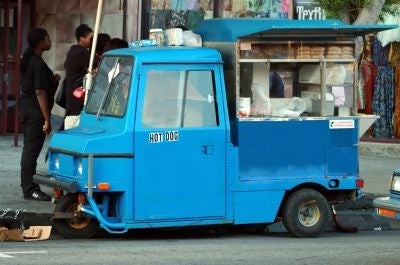Uppity food critics may have kiboshed the food truck trend as 'so over' but according to the mainstream public, the mobile food truck is in park, the ignition is off, and it's going nowhere - fast.
That's the assessment of industry food consultant Technomic, which Monday released a report that found that a whopping 91 percent of consumers polled said they think the food truck trend has staying power and isn't just a passing fad.
Only seven percent of consumers who used mobile food trucks said they expect to decrease their visits this year.
The report's findings are in stark contrast to the opinions of the foodie elite, a fringe group that likes to declare a trend over before it's been able to penetrate the mainstream public in a bid, perhaps, to appear ahead of the food curve.
Foodie magazine Bon Appétit, for instance, ran a story in May entitled, "I'm Sick of Food Trucks," while the LA Times also questioned the direction of the underground food truck scene in the same month.
Meanwhile, though food trucks use social media tools like Twitter and Facebook to advertise their whereabouts, the Technomic report found that 61 percent of consumers find out about mobile food trucks simply by stumbling upon them on the streets.
Of those who faithfully follow the whereabouts of food trucks digitally or online, 84 percent said they track their favorite mobile restaurant at least once a week.
But food truck regulars are still in the minority, points out Technomic director Kevin Higar. Seventy percent of consumers polled said they're still hesitant to purchase from food trucks - which presents huge potential for growth, he said.
"The key for long-term success is getting the non-user to come on board. One in five individuals is not aware of or has not seen a food truck, and one-third of individuals who are aware of them still haven't purchased from one," he said in a statement.
Another indication that the food truck phenomenon has parked itself permanently in the mainstream consumer world is the development of a whole series, The Great Food Truck Race which is in its second season and is hosted by Tyler Florence on The Food Network.
Other developments in the mobile food world include a new food truck locator in Chicago, Food Truck Freak that aggregates all the schedules on one site, Twitter-free, so that followers can plan their lunch breaks ahead of time.
Seattle City Council also recently voted in favor of allowing food trucks to sell fare on public streets. Previously, vendors could only do so from private lots.

Join our commenting forum
Join thought-provoking conversations, follow other Independent readers and see their replies
0Comments